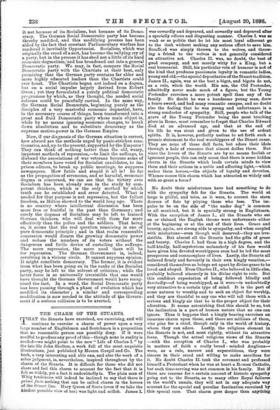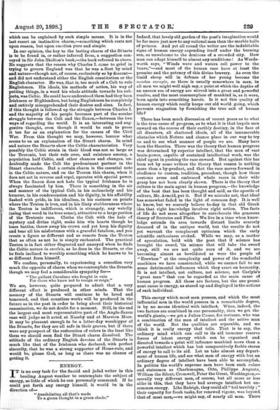THE CHARM OF THE STUARTS.
mHAT the Stuarts have exercised, are exercising, and will continue to exercise a charm of power upon a very large number of Englishmen and Scotchmen is a proposition that no reasonable person can possibly deny. If it were needful to produce any proof of this—though none in reality is needed—we might point to the new " Life of Charles I." by the late Sir John Skelton, a work full of the most exquisite illustrations, just published by Messrs. Goupil and Co. The book, a very interesting and able one, and also the work of a sober judgment, is, nevertheless, inspired throughout by the charm of the Stuarts. It is difficult for those who did not share and feel this charm to account for the fact that it is felt so widely, yet a fact it undoubtedly is. The plain man of Whig tendencies will indeed be inclined to say that there is prima facie nothing that can be called charm in the heroes of the Stuart line. Mary Queen of Scots (even if we take the kindest possible view of her) was light and selfish. James I. was cowardly and depraved, and cowardly and depraved after a specially odious and disgusting manner. Charles I. was 90 weak or so politic that he let his most loyal adherent go to the dock without making any serious effort to save him. Strafictd was simply thrown to the wolves, and throw- ing a friend to the wolves is not generally considered an attractive act. Charles IL was, no doubt, the best of good company, and not merely witty for a King, but a real humourist. Still, his particular vein of humour is not of the kind that produces passionate loyalty in romantic ladies, young and old,—the special depositaries of the Stuart tradition. James II., again, was at the best a bigot, and bigots do not, as a rule, witch the world. His son, the Old Pretender, admittedly never made much of a figure, but the Young Pretender exercises a more potent spell than any of the family. No doubt he was a handsome young man, drew a brave sword, and had many romantic escapes, and no doubt also the feeling that he was young and unfortunate is a strong conductor of sympathy. Still, people who talk of the grave of the Young Pretender being the most touching place in Rome, must remember to forget that Charles Edward died at an advanced age, and that at the end of
his life he was stout and given to the use of ardent spirits. It is, however, perfectly useless to set forth such a prosaic statement to the real worshippers of the Stuart cause.
They see none of these dull facts, but adore their idols through a halo of romance that almost deifies them. But since the lovers of the Stuarts are by no means foolish or ignorant people, this can only mean that there is some hidden charm in the Stuarts which leads certain minds to view them and their actions in a noble and affecting light,—which makes them heroes,—the objects of loyalty and devotion. Whence comes this charm which has attracted so widely and with so great a force
No doubt their misfortunes have had something to do with the sympathy felt for the Stuarts. The world at large is pitiful, and tries, as it were, to correct the stern decrees of fate by pitying those who lose. The im- pulse to be on the side of "the under dog" is common to all mankind, but it is specially strong in Englishmen. With the exception of James L, all the Stuarts who sat on or claimed the English throne were unfortunate either at the beginning or at the end of their lives. Grace and beauty, again, are strong aids to sympathy, and when coupled with misfortune—even though well deserved—they are irre- sistible. But almost all the Stuarts had the gifts of grace and beauty. Charles I. had them in a high degree, and the half-kindly, half-mysterious melancholy of his face would have given him devoted worshippers even had he led the most prosperous and commonplace of lives. Lastly, the Stuarts all believed firmly and fervently in their own kingly vocation,— considered themselves as beings set apart by divine grace to be loved and obeyed. Even Charles II., who believed in little else, probably believed sincerely in his divine right to rule. But this confident expectation of being followed blindly and devotedly—of being worshipped, as it were—is undoubtedly very attractive to a certain type of mind. It is the part of some natures to worship and to seek an object for worship, and they are thankful to any one who will tell them with a serious and kingly air that he is the proper object for their adoration. It seems astonishing that this should be so, but the inclination is a part of human nature that no one can ignore. Thus it happens that a kingly bearing exercises an immense charm upon those, and there are millions of them, who pine for a chief, though only in the world of history, whom they can adore. Lastly, the religious element in the Stuarts is not, and most rightly, without its attractive force. Though the actual religious views of the Stuarts —with the exception of Charles I., who was probably in matters of faith a really broad - minded Anglican— were, as a rule, narrow and superstitions, they were sincere in their creed and willing to make sacrifices for it. No doubt Charles II. took the covenant and professed himself a Protestant when he was at heart a Roman Catholic, but such time-serving was not common in his family. But if there are reasons for A certain amount of historic sympathy going out to the Stuarts, as to many other Royal failures in the world's annals, they will not in any adequate way account for the special and peculiar fascination exercised by this special race. That charm goes deeper than anything
which can be explained by such simple means. It is in the last resort an instinctive charm,—something which rests not upon reason, but upon emotion pure and simple.
In our opinion, the key to the lasting charm of the Stuarts is to be found in, or rather inferred from, a suggestion con- veyed in Sir John Skelton's book,—the book referred to above. He suggests that the reason why Charles I. came to grief in trying to govern England was that he was a Scot by mind and nature—though not, of course, exclusively so by descent— and did not understand either the English constitution or the English character. He was, that is, too much of a Celt to rule Englishmen. His ideals, his methods of action, his way of putting things, in a word his whole attitude towards his sub- jects, was Celtic. He could have understood them had they been Irishmen or Highlanders, but being Englishmen he completely and entirely misapprehended their desires and aims. In fact, if this thought is followed up the struggle between Charles I. and the majority of his people becomes part of the secular struggle between the Celt and the Saxon,—between the two ways of regarding the world. It is an interesting and sug- gestive thought, even though it would be rash to press it too far as an explanation for the causes of the Civil War. From this thought we may, however, borrow what seems to us an explanation of the Stuart charm. In mind and nature the Stuarts show the Celtic characteristics. Very possibly the Celtic strain in their blood was not so large as the Teutonic, but their rule over, and existence among, a population half Celtic, and other chances and changes, un- doubtedly made the Celt the predominant partner in the Stuart character. But a certain charm is the essential note in the Celtic nature, and on the Teuton this charm, when it does not act in reverse and repel, operates with special power. When the Saxon does not hate the typical Irishman he is always fascinated by him. There is something in the air and manner of the typical Celt, in his melancholy and his humour, in his condescension and his dignity, in his affability dashed with pride, in his idealism, in his easiness on points where the Teuton is iron, and in his flinty stubbornness where the Teuton is indifferent, which is strangely, nay weirdly (using that word in its true sense), attractive to a large portion of the Teutonic race. Clothe the Celt with the halo of mystery and divine right, make him win hearts though he Loses battles, throw away his crown and yet keep his dignity and bear all his misfortunes with a graceful fatalism, and you create a figure so different and so remote from the Teuton that as often as not he is simply enchanted. The practical Teuton is in fact either disgusted and annoyed when he finds the Celtic nature in excelsis, as he does in the Stuarts, or else he feels inclined to worship something which he knows to be so different from himself.
We confess, personally, to experiencing a sensation very much the opposite of charm when we contemplate the Stuarts, though we may feel a considerable sympathy for—.
" The gallant Cavaliers who fought in vain For those who knew not to resign or reign."
We are, however, quite prepared to admit that a very different effect is produced in other minds. That the memory of the Stuarts will continue to be loved and honoured, and that countless works will be produced in the future as in the past in order to bring about their historical canonisation, we do not doubt for a moment. Still, in the end the largest and most representative part of the Anglo.Saxon race will judge as it acted at Naseby and at Marston Moor. It may be pleasant enough to be a latter-day worshipper of the Stuarts, for they are all safe in their graves, but if there were any prospect of the restoration of rulers in the least like them we should soon find the Stuart charm dissolved. The attitude of the ordinary English devotee of the Stuarts is much like that of the Irishman who declared, with perfect sincerity, that he was a strong supporter of Home-rule, and would be, please God, as long as there was no chance of getting it.



































 Previous page
Previous page